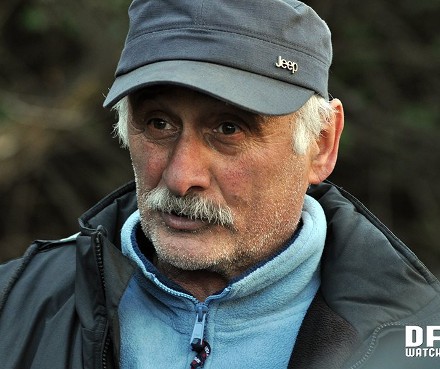
TKIBULI, DFWatch–More than two weeks have passed since coal miners in Tkibuli in western Georgia began standing watch day and night in front of the company’s office, demanding higher salaries. So far, without results.
Their demand is to increase their salaries by 40 percent to compensate for Tkibuli’s loss of beneficial tax status. The most recent offer from the company is a 5 percent pay rise after two months. The workers rejected that offer.
DF Watch visited the workers on Friday and spent a day with them. Tkibuli lies between mountains and is about an hour’s drive from Zestaponi, another industrial town in western Georgia, with a factory which produces ferro-alloys.
Last year, the government amended legislation to clarify the list of towns and villages with status as ‘mountain settlement’, which qualifies for advantageous tax rules. The new law, which took effect on January 1, removed settlements situated below 800 meters above sea level from the list. This included Tkibuli. Workers’ income tax increased from 10 to 20 percent.
January 8, an organizing group of Tkibuli coal miners asked Saknakhshiri GIG, the company that owns the mines, to increase salaries. The demand was also influenced by a sharp drop in the value of lari, the national currency, over the last few years.
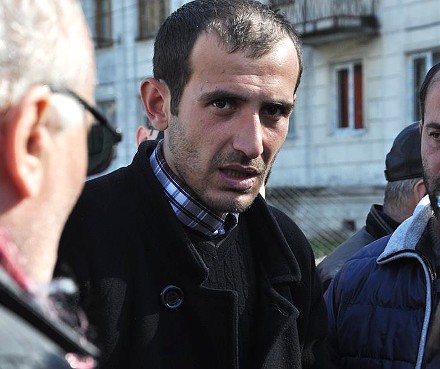
Seeing their demands not leading to results, the miners went on strike a little over two weeks ago. About 1,000 people are employed in the mines. Two out of the four mines are still functioning: Dzidziguri and Mindeli. Now the parties are trying to negotiate, with involvement by government representatives.
Workers react with anger every time someone mentions salaries. Employees at Saknakhshiri’s office are paid thousands of laris per month, while the mine workers get from 800 to 1,000. Other workers who carry heavy loads or do other manual labor receive less than 400 laris.
“They let a hungry man work in that bloody mine and we pay to feed their stomachs,” Amiran Khvadagiani, one of the workers who are on strike tells us. People voted for the Georgian Dream government, hopeful that they would help people, he continues, but as he sees it the government has abandoned them.
“We elected you. Instead of dreams we have dream disease, we have black death of a dream from the 17th or 16th century,” he exclaimed.
Most of the conversations between workers concern either politics, salaries or income.
“Apart from this damn work, I have a field, you know,” another miner, also named Amiran, tells his friends.
“Everything was fine, until the weather went wrong. Afterward, I tried to bring the harvest back by fertilizing it several times, but all in vain. How can I give up now?” he asks. “Those guys from Kredo [a microfinance organization] came by knocking on my door after 22:00. Can you imagine? I said, ‘here I am. You can take me, I have nothing to give you.’ They looked at me, tried to snatch some money from me, but when they learned that I was completely broke, they left.”
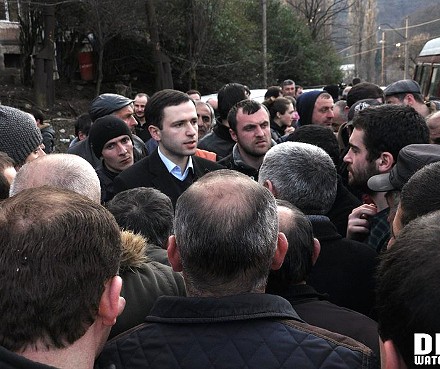
Younger guys, who also work in the Mindeli mine, were discussing the previous day’s protest.
“Where you have been today?”
“I barely stood on my feet. I couldn’t stay any longer. I had to sleep. I saw you on the TV, you TV star, heh.”
“We all should talk now. You have to, as well. We shouldn’t hide from them. See how they manipulate the information?”
On Friday, management allowed TV journalists in and made a statement claiming that only 200 workers are on a strike, who pressured the other 1,000 to not go to work.
“They want to win the information battle,” Levan Beshkenadze from the strike committee said in a fury. “This is bullshit.”
“Look around. Even our women are on strike. Who forced them? We couldn’t grab them by their bags and clothes to force standing here. Ridiculous,” another worker says.
Most of the workers tried to have a humorous approach to their problems, talking with an Imeretian dialect, making everyone around them laugh.
“My grandson was accepted on the rugby team. His father wanted to bring him to me. Imagine if he had asked for a candy and me saying that I have no money. What a shame.”
“That’s why I am never getting married.”
“No, man. You should marry a woman with grown up kids, you can save millions on those diapers.”
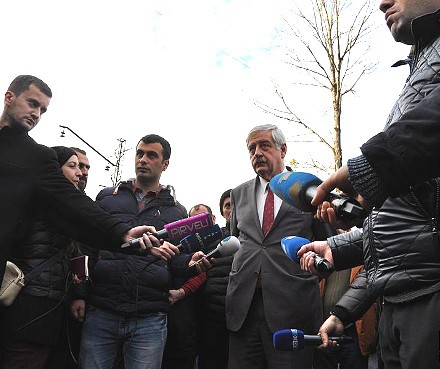
The group laughed when a representative of the Health Ministry came out from the building and a crowd of journalists and workers surrounded him. There was a silence as everybody listened to him carefully and waited for the journalists to give a signal for him to talk.
“So.. Negotiations continue,” he said calmly.
“So.. that’s it?” a journalist asked.
“If you will let me go back inside, things will continue. I cannot say anything else,” he added, leading to shouts from the crowd.
He then specified that the so-called mediators of the Health Ministry are not yet involved in the negotiations, as the media earlier reported, but only ministry representatives like himself, a deputy head of the Labor Department. He said that engaging mediators in the process requires agreement from both sides, which hasn’t yet happened.
Talks and conversations continued with the TV journalists, who continued collecting comments for their live reports.
“We are working. We extract the coal and they get the rewards. They receive more salary in a month then we get in a year,” Amiran, the journalists’ favorite respondent, said again. “And the government we elected is our own enemy.”
A small groups of workers surrounded a groups of NGO representatives who arrived to express their solidarity and help workers with issues like formulating their demands in a proper way.
One group actively described the problems of the miners, working conditions and safety issues, which are far from perfect, just like in the manganese mines in Chiatura: there is not enough staff, problems like not having locomotives and dragging tons of freight by hand, vacation issues and overtime pay. But the issue of pay became so acute that workers were ready to give up all the other issues and focus only on demanding increased pay.
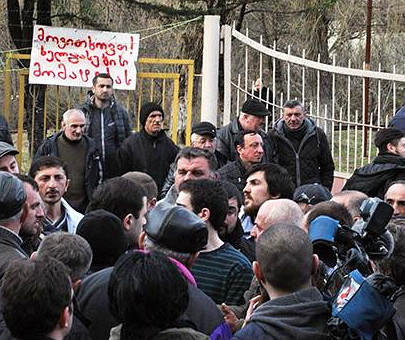
When it comes to work conditions, the most discussed issue was that workers are locked inside the mine until their shift is over. Every worker can confirm this information and they became angry when a woman from the management, who likely hasn’t been in the mine herself, explained that there was another entrance to the mine which remained open.
“Why do people even listened to her? How can she know? Here we are, me, this man, those people, everyone will say the same. You go inside, you are locked in until the shift is over and we cannot do anything about it.”
The door remains locked even if the person feels bad, until a guard passes by and helps open it.
Workers recall how a man broke his leg and waited for two hours until door was opened.
At the end of the day, financial director of Saknakhshiri GIG Zurab Gelenidze announced that there had been a promise of 5 percent salary increase after two months.
“They ridicule us, people who are facing death every day. It’s a shame even to think about it,” Davit Kakauridze, a worker, told journalists after Gelenidze’s announcement.
“This is what I can offer you. I won’t offer anything else today,” the financial director said.
Throughout the day, presidential adviser Kakha Kozhoridze met with the company’s representatives and the workers. Mostly the discussions centered on a contract which the company signed with workers in 2011. It says that any increase in salaries has to be in accordance with the inflation.
Workers claimed the company lied to them, while the company claims that the signature on that contract was fake.
“I don’t believe that the signature is fake and even if it is, it has to be of primary interest for the company to investigate this matter,” Kozhoridze said.
“And where have they been for the past four years if it was fake?”
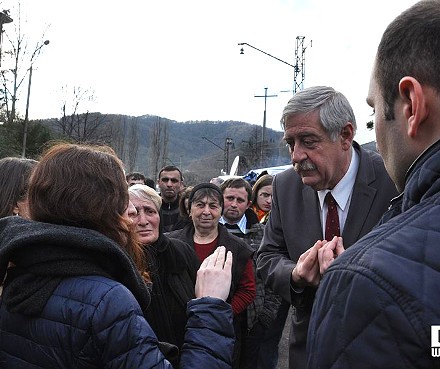
The strike continues. Workers do not plan to give up.
In Tkibuli, public transport stops running early, so it is not possible to get back to the capital in the evening. I had to hitchhike. First I met a bus driver who was going home and who left me at the entrance to the town.
“What do you think, what will happen with these people [mine-workers]?” was the first thing he asked. He said the whole town is dependent on the coal mines and work cannot be halted any more.
Another man, who stopped to drive me, was a vendor, driving an old scarlet Ford minibus with his neighbor’s boy, who was paid a little money for assistance.
The fate of the workers on strike was again the first question he asked.
“I saw you there during the strike. You were taking pictures. I drove by and imagined, my car was live on Imedi TV, you can watch it in the evening, a scarlet car, me and this little fellow,” he said happily.
He used to work at a wine factory for 18 years during the Soviet Union, he continues, but then his world collapsed and he had to become a vendor. He sells fruits and vegetables in Tkibuli and you could easily notice it from the smell of apples and tangerines in the car.
He didn’t hesitate to criticize the government.
“I earn three times less than I did three years ago,” he says, but it turns out that he also hated the previous government.
Then he adds that if the mines will stop working, he will have no income.
“They have been on strike for two weeks now. The markets are not giving away food as they aren’t sure that there will be pay at the end of the month. I sell at a market, but who knows what will happen next,” he says.
“I pray to god that everything will end peacefully.”
He bought cookies for his granddaughter and left me on the highway about 20km away from his village, making sure that I got on a marshrutka to Tbilisi.

